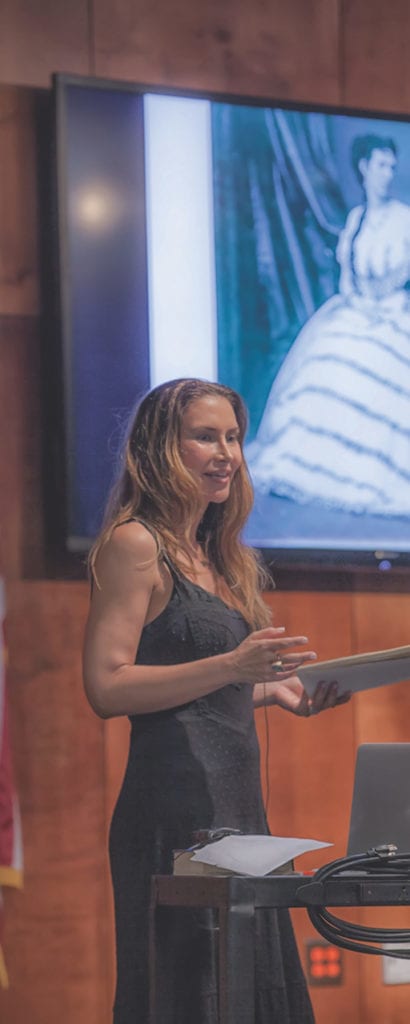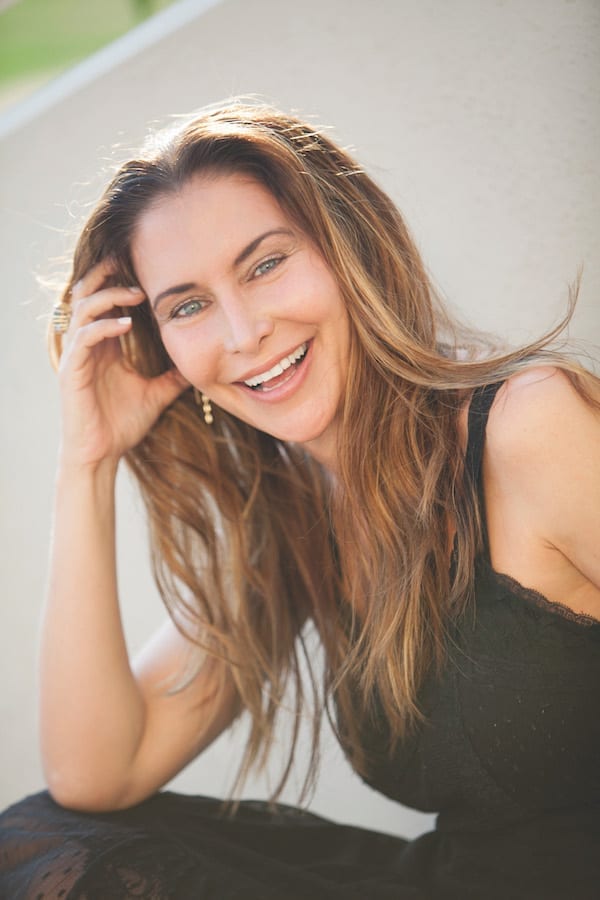Author & Historian
Karen Abbott is a New York Times best-selling author of Sin in the Second City, American Rose, and Liar, Temptress, Soldier, Spy. Her career started as a young journalist, where she found a passion for gathering details; this led her to writing historical non-fiction novels. Wanting to bring women to the forefront in history, her books feature women in a central role.
You began writing as a young journalist. What was your beat?
I started off at a weekly newspaper called Philadelphia Weekly covering everything from murderers to serial killers. I loved the dark side of storytelling in that way. I covered profiles, politicians, and was a little bit of a jack-of-all-trades.Th e thing I most enjoyed was taking a story and really examining it. There was a car crash in South Philadelphia that killed six or seven children in a van and devastated that community. It had a ripple effect. I spent a long time really getting a blow-by-blow of what had happened and how it impacted the community. For another story, I randomly picked a name out of the phone book and wrote about this person. It was a woman who was a descendent of slaves. Her history still remained and somewhat defined her. She was living in a complex in South Philadelphia. That story was fascinating. I think what was the most helpful about my experience in journalism was, back when I was doing this, editors would say, “Go ahead, write 7,000 words on this, write 10,000 words on this.” It was a freedom of storytelling that you don’t have in print today. I think that experience prepared me, and probably a lot of my colleagues who ended up writing books, to be able to write 100,000 words, particularly, after you’ve been doing these pretty long narrative pieces for a while.
 You enjoy storytelling about real events and people with a unique style or genre.
You enjoy storytelling about real events and people with a unique style or genre.
My goal, with writing non-fiction, is to try to make it read like a story. I want somebody to pick up a book of history and say, “This doesn’t read like a history book. This reads like I’m reading it in real-time,” or that this was somebody’s diary or a record of what was happening at the time because history is exciting as anything. I think people have a negative view of history and that it’s boring on the page, but it wasn’t boring when it happened. The goal, or at least my goal in writing, is to make these people come alive in a way that makes them seem real and makes the event seem immediate and present and relevant to today, and not just something dusty and just stuck in the archives.
How much creative latitude do you give yourself when dealing with historical facts?
There are novelistic techniques that a lot of narrative non-fiction people employ. You can cut off a scene where there’s suspense. You cut off and let the reader say, “Oh, God, I need to get back to that.” And you can make scenes. My goal whenever I’m writing a book is to visualize how I think the movie would look? How would the scene look? Who would play this? Where would they be standing? What would they be doing? I write it like a scene. It’s almost like writing a movie script. The only way that you can do that though, is if you gather the details. I think one of the things journalism really helped me learn was gathering details. The writer of narrative non-fiction cannot try to be funny. You cannot try to be smart. You cannot try to be poignant. You have to let the details do that work for you. The real skill is in gathering details. And no, you can’t really play with facts. You can’t make up dialogue. You can’t go into somebody’s head unless you have a diary that said, “this is what I was thinking at this time.”
When did you start writing?
Well, I always liked to write. I remember, when I was about 11 and 12, I started writing short story murder mysteries and sending them to Ellery Queen Mystery Magazine under the name of K.L. Abbott. Even at that point, I thought I should use a name that doesn’t indicate that I’m a girl. It is so sad that, even at age 11, I was internalizing that I won’t be taken as seriously if they think that I’m a girl. It didn’t matter that I was 11 or 12. Of course, I was rejected; I was 11. My story was terrible. It was actually about a murderous cross-dressing grandmother. I’ll never forget it. They, very rightly, rejected me, but I kept writing. I never thought that writing was something people did as a profession. It was just fun to me. I had dreams of becoming a lawyer.
You’ve been quite prolific with the works that you’ve done.
I wish I were more prolific. It’s hard to watch my novelist friends when they come out with something every year, every two years. A couple of my friends have had two books in the time I’ll have another book out. But non-fiction just takes longer. The research is so much fun. I never want to skip out on that. I do most of it myself. I have a woman in Washington, D.C. who can retrieve files from the National Archives. I don’t know if you’ve ever written to the National Archives, but it is a labyrinth of confusion and insanity, and the records are seldom where they need to be. You really need somebody who knows how to focus and understands the systems. I could go down there for a week and not and what I was looking for, and she knows where to get it. So, I have somebody in D.C. who goes to the National Archives and then pretty much everything else I do on my own.
What is your creative inspiration when writing?
Before I start writing, I usually like to listen to some music that’s in the time period that I’m writing about. So, when I wrote Sin in the Second City, I was listening to ragtime. I would really try to just put myself in 1905, or whatever year it’s been, 1900 to 1910. With Liar, Temptress, Soldier, Spy, I listened to some war music and some of the songs that were popular at that time.
How do you get into the writing itself?
I read the diaries of the women who were writing about that time. Some of them are incredibly eloquent. I use the time to get in the mood. I feed my bird, bring my bird in the office with me, and I open up the files. Sometimes it’s a Herculean task just to open the file, but here’s a trick that I always use: you always stop in the middle of a sentence. Even if you’re on a roll, if it’s about time to wrap up, you stop in the middle of a sentence because when you go back, you’re on a roll. You know exactly where to pick up, and it helps your momentum. I’m a night owl, so I love to write at night. But the problem is I’m also an insomniac. I’ll never sleep if I am not careful. So, I have to cut myself off at 8:30 when I’m really getting going, which is a shame. Then maybe twice a year, when I’m on deadline, I will go out to the North Fork of Long Island, rent a place for a month and not speak to anyone, not see anyone. It’s hard not to speak or see anyone in New York City. So, I go out there and just sort of hunker down and basically, become a hermit.
Is exercise a part of your creativity?
Yes, especially when I’ve been on the road eating junk. No, I exercise almost every day. I tried to get into meditation. Exercise/meditation go hand in hand. If I stop exercising, I’m not meditating. So, I try to tie one to the other. I do a lot of yoga. They say stay in the moment, and I use that time in the pose to think about what I’m doing and where I am on the page, where I am in the story, and sort of try to tap into creativity.
 I noticed in all of your works, women play the central role. Why?
I noticed in all of your works, women play the central role. Why?
It’s just naturally where my needle goes. Anytime I start thinking about a subject, I’m always thinking, “Well, what were the women doing?” And not just any women. You know, what were the bad women doing? What were the defiant women doing? So, everybody has a needle on their scale, and that’s where my needle always goes. Women were written out of history. Our accomplishments have been overlooked largely. In Liar, Temptress, Soldier, Spy, it was really just disheartening to know that nobody has really heard of Elizabeth Van Lew, a Union spy who lived in Richmond, Virginia, the capital of the Confederacy. The Union would not have won the war without her. But nobody’s heard of her. She should be a household name along with Stonewall Jackson and Lee and Ulysses S. Grant. Nobody has heard of her. I feel if I can just bring her to the attention of some people, that would be great. The other part of it is these are women whose lives I wish I had lived just because they changed history. These were incredibly strong women who were defying the social morays of their time and daring to do things that today wouldn’t be as lauded or recognized. They were daring at a time when it was even more difficult to be daring. There were just so many more restrictions on women. And so, writing about them is the next best thing.
A common theme of many of your women that you write about is that they were dismissed?
I absolutely think so. Women are still being dismissed. But, of course, it was worse a hundred years ago.
Have you experienced dismissal in regards to your writings and as an author in the 21st Century?
Sure. Every female author has experienced that.
Why?
I just think that women, across the board, have to work harder to be taken more seriously than men. I always said women have to have routine quality. Women cannot be as mediocre as men and get away with it. Look, women need the freedom to mess up and to make mistakes, and it be as mediocre as men, but we’re not allowed to do that.
I want you to pretend that I am a literary student, and you get to give me one pearl of wisdom, one lesson of life, one something, and I’m a woman, and I’m young. What would you say to me?
Oh, I would tell her, if I’m speaking to a young woman, that people only disrespect you with your permission. If you have a sense of self, you should try to carry that with you, and there’s nothing you can’t at least attempt to do. You should always be true to that, and don’t diminish yourself for other people.
